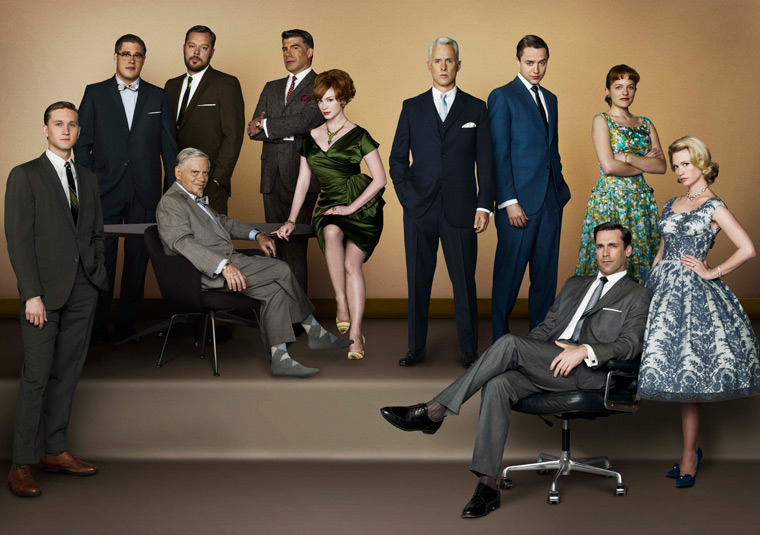Season Two of Mad Men finds Don Draper and the rest of our flawed heroes staking their claim on a world in transition. Between the Cuban Missile Crisis and much more personal conflicts, these characters discover what it means to balance work and life in a world that never stops turning.
Know When You’ve Got a Good Thing Going
Quite a few Mad Men characters have humbling experiences along their journey — lessons driven home by the number of times they fail to recognize the value of their already charmed lives.
In Season Two, Duck Philips pressures the Sterling Cooper partners to pitch an old client of his, American Airlines. To do so, they’ll have to drop Mohawk Airlines from their client roster to avoid a conflict of interest. Don serves as the voice of reason, but he’s overruled. In a stunning blow to the company, the American Airlines pitch fails, and the firm finds themselves humiliated and in financial jeopardy.
The lesson here is to know when you’ve got a good thing going. This doesn’t mean “settling” and it doesn’t mean “accepting the status quo.” Rather, it means not jeopardizing your hard-won stability with dangerous gambles and uncertain outcomes. Roger learns this, too, when he ends his decades-long marriage to cavort with his secretary.
Don’t Distract Yourself With Technology
Madison Avenue’s relationship with technology is governed largely by the fact that the show takes place in the fifties, sixties and seventies — long before every desk had a computer on it — but the lesson is no less important to us today. The clear message is that a great deal can be accomplished if we don’t bow to technological distractions.
The folks at Sterling Cooper hold face-to-face meetings as a matter of course, even when they’re extremely inconvenient. The company also reveals a highly organic creative process that comes to life on drafting tables and desks instead of computer screens or Wacom tablets. Again, the employees don’t have much of a choice — at least until the technology is invented in a few decades — but it still shows us what’s possible with a “back-to-basics” approach.
Many of us in the business and professional communities appear to be highly dependent on the trappings of modern technology. While that’s true, even pointing it out has become a cliché. We should ask ourselves a simple question every day: Is this really helping me out, or is it just a distraction?
Holding on to Grudges Is Childish and Unhelpful
One of the central conflicts in Mad Men Season Two is the unambiguous animosity between Duck Phillips and Don Draper. The particulars about why these two men are at odds is immaterial — the result is that both men behave badly and tarnish not just themselves, but their company’s good name.
While Don is traveling, Duck tries to defect to Putnam, Powel & Lowe (PPL), but they turn him down. Countering, he tries to leverage Sterling Cooper’s difficult financial situation for a PPL buyout, after which he’ll take over leadership of Sterling Cooper. Behind Don’s back, Duck drums up support for his coup among the other partners. As you might expect, Don is livid when he finds out what’s been going on in his absence.
There’s a lesson here about not hanging onto grudges — and it’s a lesson that applies as well to business as it does to our personal lives. Don and Duck both behave badly, sabotaging their personal interests and the well-being of their company, on the altar of “getting even.” They provide an example we all can learn from.
Recognize the Power of Assertion
Although Duck, Don and the rest of the gang are often at odds, trading barbed words and duplicitous deeds, one thing they all have in common is an almost relentless assertiveness. It frequently leads them astray, but they all possess a strong will — a will that, when turned toward charitable or collaborative goals, always serves them well.
As usual, Peggy Olsen provides a perfect case-in-point for the power of assertion. Her example proves that tenacity is not necessarily synonymous with arrogance, and that ambition doesn’t have to undermine our values.
Peggy spends most of Season Two securing more trust and responsibility from the men she works with, and she does it by staying true to herself and trusting that she has a lot to offer Sterling Cooper. (You go girl!)
You Can’t Please Everybody All the Time
This lesson is so familiar to us by now that it has been re-worded, repackaged and remixed thousands of times. It still holds true, both in the fictional world of Mad Men and in our very real modern society.
Mad Men is, among other things, a study in stretching yourself too thin. Don tries to be an adequate husband, a prolific philanderer and a wildly successful creative lead all at once. Indiscretions aside, he clearly has too much on his plate. By wearing so many hats at once, he does a handful of things well and many things poorly, rather than focusing his efforts on what’s really important.
The characters of Mad Men seem to function at their best when they stop worrying about being all things to all people and really cut to the heart of what they want out of life. What does this career mean to me? Why am I on this path? It might sound selfish, but understanding ourselves and seeking happiness for its own sake is the first step toward success — once that happens, everything else and everyone else will follow in due time.
Feature Image Taken by The Tigress From Madison Ave

